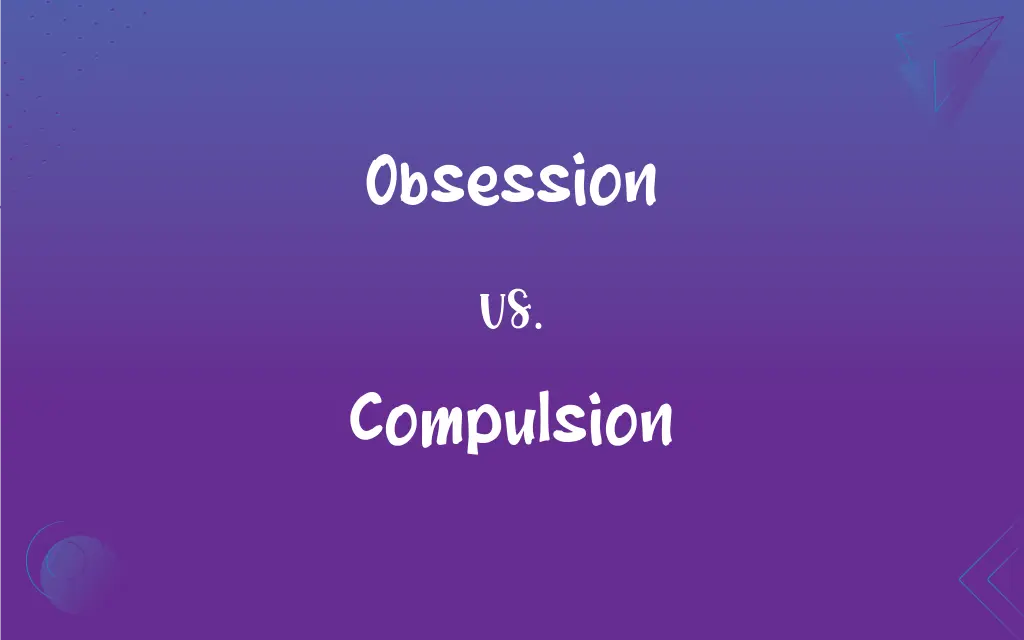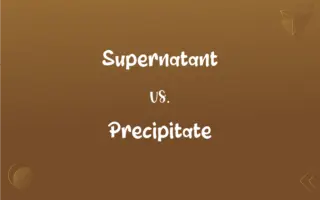Obsession vs. Compulsion: What's the Difference?
Edited by Aimie Carlson || By Janet White || Published on December 21, 2023
Obsession is a persistent, intrusive thought or idea, while compulsion is a repetitive, often irrational, behavior driven by an urge to alleviate anxiety.

Key Differences
Obsession refers to recurrent and persistent thoughts or impulses that are intrusive and cause distress. Compulsion, on the other hand, involves repetitive behaviors or mental acts that a person feels driven to perform in response to an obsession.
Obsessions are often experienced as unwanted and can significantly disrupt a person’s cognitive processes. Compulsions are actions taken to reduce the anxiety or discomfort caused by these obsessions, even if they are logically understood as unnecessary.
The content of obsessions can vary widely, including fears, aggressive thoughts, or symmetrical needs. Compulsions might manifest as behaviors like excessive hand-washing, checking, or ordering items in a certain way.
In terms of psychological impact, obsessions can lead to significant distress and interfere with daily life. Compulsions, while meant to counteract this distress, can become time-consuming and equally disruptive.
Both obsessions and compulsions are key components of disorders like Obsessive-Compulsive Disorder (OCD), where they form a cycle of intrusive thoughts followed by ritualistic behaviors.
ADVERTISEMENT
Comparison Chart
Nature
Persistent, intrusive thoughts
Repetitive behaviors or mental acts
Purpose
Often cause distress or anxiety
Aimed to reduce anxiety from obsessions
Manifestation
Mental (thoughts, fears)
Behavioral (actions, rituals)
Awareness
Usually aware they are unreasonable
Often knows the behavior is irrational
Impact
Causes mental distress
Causes disruption in daily life
ADVERTISEMENT
Obsession and Compulsion Definitions
Obsession
Unwanted Impulses.
He had an obsession with checking the door multiple times.
Compulsion
Driven by Anxiety.
He had a compulsion to arrange his books in a specific order.
Obsession
Mental Fixation.
His obsession with numbers manifested in counting everything.
Compulsion
Repetitive Behavior.
His compulsion to wash his hands was exhausting.
Obsession
Intrusive Thoughts.
His obsession with perfection often caused him anxiety.
Compulsion
Uncontrollable Urges.
Her compulsion to count steps interfered with her walks.
Obsession
Persistent Ideas.
Her obsession with cleanliness affected her daily routine.
Compulsion
Ritualistic Acts.
She felt a compulsion to check the stove repeatedly.
Obsession
Recurrent Fears.
Her obsession with germs kept her from socializing.
Compulsion
Irrational Actions.
His compulsion to avoid cracks in the sidewalk was time-consuming.
Obsession
A compulsive, often unreasonable idea or emotion.
Compulsion
The act of compelling.
Obsession
(Psychiatry) A pattern of unwanted or intrusive thoughts or urges that recur persistently, often accompanied by symptoms of anxiety.
Compulsion
The state of being compelled.
Obsession
The quality of being obsessed.
Compulsion
An irresistible impulse to act, regardless of the rationality of the motivation
"He felt an animal compulsion to flee the hotel and the city" (Paul Theroux).
Obsession
An idea that engenders a compulsive or irrational preoccupation, or the preoccupation thereby engendered.
Compulsion
(Psychiatry) An act or ritual that a person feels compelled to perform repeatedly, often to reduce the distress caused by an obsession.
Obsession
An activity or entity that inspires a compulsive and potentially unhealthy fixation, or the fixation thereby inspired.
Editing Wikipedia started as a hobby, but it's turned into a complete obsession of mine.
Compulsion
An irrational need or irresistible urge to perform some action, often despite negative consequences.
During the basketball game, I had a sudden compulsion to have a smoke.
Obsession
Influence or control by evil spirits without possession.
Compulsion
The use of authority, influence, or other power to force (compel) a person or persons to act.
Obsession
The act of besieging.
Compulsion
The lawful use of violence (i.e. by the administration).
Obsession
The state of being besieged; - used specifically of a person beset by a spirit from without.
Whether by obsession or possession, I will not determine.
Compulsion
The act of compelling, or the state of being compelled; the act of driving or urging by force or by physical or moral constraint; subjection to force.
If reasons were as plentiful as blackberries, I would give no man a reason upon compulsion.
With what compulsion and laborious flightWe sunk thus low.
Obsession
An excessive preoccupation of the thoughts or feelings; the persistent haunting or domination of the mind by a particular desire, idea, or image.
Compulsion
An urge to do or say something that might be better left undone or unsaid
Obsession
Any driving motive; a compelling goal; - not necessarily implying a negative judgment, as does sense 3; as, the coach was obsessed with winning the state championship
Compulsion
An irrational motive for performing trivial or repetitive actions against your will
Obsession
Something that causes an obsession{3}.
Compulsion
Using force to cause something;
Though pressed into rugby under compulsion I began to enjoy the game
They didn`t have to use coercion
Obsession
The state of being obsessed.
Obsession
An irrational motive for performing trivial or repetitive actions against your will
Obsession
An unhealthy and compulsive preoccupation with something or someone
FAQs
Is compulsion always related to obsession?
Often, but not always. Compulsions can sometimes exist independently.
Are compulsions always physical actions?
No, they can also be mental acts like counting or praying.
Can obsessions change over time?
Yes, the nature of obsessions can change or vary.
Can children have obsessions?
Yes, children can experience obsessions.
Can obsessions be positive?
Typically, they are distressing, but some people may channel them into productive activities.
Do obsessions always lead to anxiety?
They often do, but the level of anxiety can vary.
What causes obsessions?
Obsessions can be caused by a variety of factors including stress, genetics, and brain chemistry.
Is a compulsion a type of addiction?
No, they are different, though they can sometimes appear similar.
Are compulsions always noticeable?
No, some compulsions can be discreet or internal.
Can stress trigger compulsions?
Yes, stress can be a trigger for compulsive behaviors.
Are compulsions always harmful?
They can be, especially if they interfere with daily functioning.
Can compulsions be prevented?
Early intervention and therapy can help manage compulsive behaviors.
Can compulsions be treated?
Yes, through therapy and sometimes medication.
Can compulsive behavior be learned?
Yes, it can sometimes be learned or influenced by external factors.
Is obsession the same as being passionate?
No, obsessions are involuntary and distressing, unlike a passion or interest.
Can medication help with obsessions?
Yes, certain medications can help manage symptoms.
Are obsessions a sign of mental illness?
They can be a symptom of disorders like OCD, but not always.
Do people with compulsions lack self-control?
It's not about self-control; compulsions are often beyond voluntary control.
Is having a hobby considered an obsession?
Not usually, unless it becomes distressing or interferes with daily life.
Do obsessions have a rational basis?
They may seem irrational, but to the person experiencing them, they feel very real.
About Author
Written by
Janet WhiteJanet White has been an esteemed writer and blogger for Difference Wiki. Holding a Master's degree in Science and Medical Journalism from the prestigious Boston University, she has consistently demonstrated her expertise and passion for her field. When she's not immersed in her work, Janet relishes her time exercising, delving into a good book, and cherishing moments with friends and family.
Edited by
Aimie CarlsonAimie Carlson, holding a master's degree in English literature, is a fervent English language enthusiast. She lends her writing talents to Difference Wiki, a prominent website that specializes in comparisons, offering readers insightful analyses that both captivate and inform.






































































